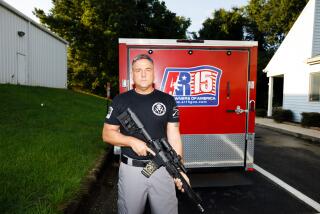Boyhood Cowboys Don’t Become Adult Killers : Play: Sometimes a toy is just a toy--be it a gun or a doll. Don’t let adult fears stifle children’s imaginations and explorations.
My 3-year-old son has very recently become head-over-heels enamored with toy guns, swords and knives, and this has compelled me to clarify my views about little boys’ toys and violence.
Before he was born, I never gave much thought to these kinds of toys. I suppose my ideas would have been mildly negative. After all, I’m a psychologist, a left-leaning one at that. I believe in resolving conflict peaceably. As an adult, I would never own a gun. I abhor the violence on the streets of Pasadena and Los Angeles. I currently have a letter in the mail to my congressman, urging him to uphold the ban on assault weapons.
Yet I behold my son’s joy, his sheer exultant pleasure when brandishing a sword, a gun, a knife. And I find myself wondering what could be wrong with something that gives him such a thrill, that makes him feel so alive? There’s got to be a difference here, between the joy of a small boy at play, and, say, the criminal’s callous disregard for human life as he goes about his brutal business.
Erik Erikson writes in “Childhood and Society” that children in the “initiative versus guilt” stage of development are in an “intrusive” mode, characterized by fantasies of “intrusion into other bodies by physical attack; intrusion into other people’s ears and minds by aggressive talking; the intrusion into space by vigorous locomotion; the intrusion into the unknown by consuming curiosity.” “Intrusive” play is the imagination at work on important developmental tasks and needs to be fostered. He also emphasizes the importance of guiding “intrusive” play so that it is kept safe, kept within boundaries so that no one is hurt or frightened.
Many parents of toddlers are horrified about the idea of children playing with weapon toys. They believe that an inevitable, continuous line exists between the play of childhood and the proclivities of an adult. Today a lollipop-stick sword, tomorrow an AK-47.
I think such an attitude confuses play with reality and prohibits an important kind of play that kids need at this developmental stage.
We need to take a look at this assumption, to “unpack it,” as the philosophers say. We need to distinguish between the innocent play of healthy children and the dark deeds of warped and twisted souls. The former, properly guided, leads to healthy attitudes about one’s capacity to be assertive, about one’s power to act on the world. And this stage is followed in turn by many other stages, and a great deal of further learning about how to interact with others. The latter type of behavior is a tragic tale of development gone terribly wrong, of minds haunted and tormented.
Perhaps an analogy illustrates the point. Many little girls go through a period when they are besotted with baby dolls. All day long they feed them, change them, fuss with them. Yet no one becomes alarmed, fearing that this current craze will lead to teen-age pregnancy and a life of poverty. No one snatches these dolls out of their arms, trying to protect them from feared future consequences.
Why? What’s the difference? Why is it that we understand little girls’ play to be play, yet get so confused about little boys’ play?
Those of us in the mental-health community know what kinds of childhood experiences lead to violence. A violent adult has been exposed to violence as a child--not stick swords and cap guns, mind you, but real, actual violence. Emotional needs have been ignored and neglected. Bodies have been horribly beaten. Loved ones have been abused or killed by others. These kinds of experiences sow the seeds of violence.
Is there any chance that a toddler playing safely with toy weapons is being encouraged to violence? No. Let’s not confuse the cares of the adult world with the ways children need to be. Let’s not rob them of the important imaginative play that they need.
More to Read
The biggest entertainment stories
Get our big stories about Hollywood, film, television, music, arts, culture and more right in your inbox as soon as they publish.
You may occasionally receive promotional content from the Los Angeles Times.










